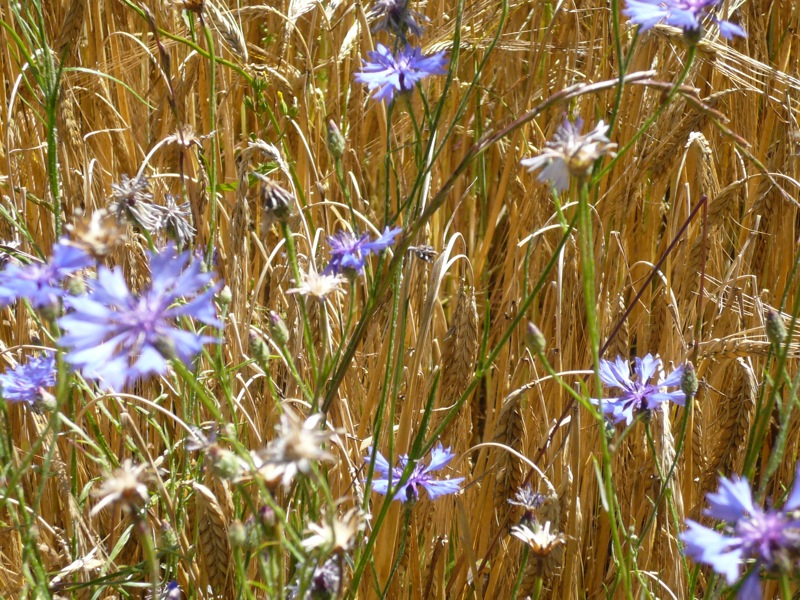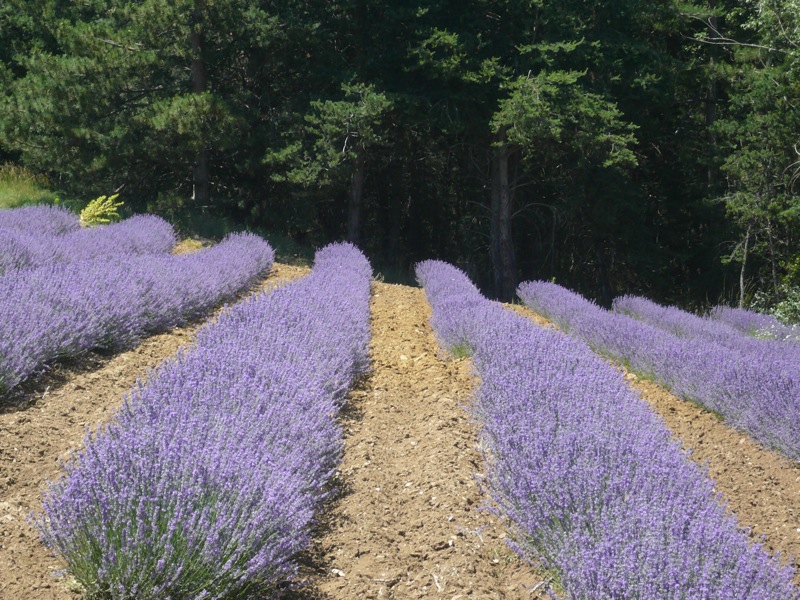smelling the flowers

The concert in Emmanuel was a birthday present for Emmanuel’s wife, Claude, and the quartetting gals of April were once more gathered together. Two, unable to speak from weariness, emerged from the TGV from Aix where they had finished rehearsing at one that morning. No amount of news or cherries from the Ventoux could revive them and the only remaining hope was Haydn. I had learned my lesson and we piled silk concert clothes and eighteenth century instruments in amongst the week’s dozen wine bottles comfortably, if a little shrouded in the dust of three years’ organic renovation, into the Renault we now call ‘The Tank’.
Arriving at the Chateau we were greeted by Emmanuel and Claude and their six immaculate children, their tanned skin, long legs, snub noses, perfect bobs and rounded collars straight out of a Louis Malle film. We were served coffee and chocolate covered figs in their living room, and as I admired the perfect tommettes and the grey green waxy doors, we discussed the weather. A place for us to play had been marked out with sunflowers under the plane tree, and a hundred seats fanned out from the semicircle of our chairs. However, the drops of rain that were beginning to fall were bulbous with wet promise. We agreed to wait till the last moment before we decided to take the whole event into the cuverie.
We got out our instruments and, surrounded by socks drying on little round sock dryers, papers, and plates of the first figs that make up the charming details of a Provençal family dining room, we started to rehearse. My friend and colleague Berenice had been staying with us for a few days and, returning from a day in the lavender fields and a good long girlie lunch, we had had a tough rehearsal à deux the night before. We had conflicting ideas about tempo and character - she thinking that the former produced the latter whilst I was convinced that the latter gave birth to the former. I had felt pushed by the breathless insistence of her tapping foot and she held back by my lingering to smell the flowers. Luckily we care for and respect each-other enough to know that, though we had a concert the next day, we could not hurry a natural process; that the truth was probably somewhere in the middle and that, though our process had been aborted, we had a job to do. We had hugged and opened a good bottle of Viognier to go with the sea-bass. As soon as we started playing à quatre I felt my rib-cage expand, my shoulders drop and the music cradle me, soothing my insecurities.
At the appointed hour we took our cases down to the tree and looked up at the pregnant grey of the sky. We unpacked but the first drop fell on my Benjamin banks cello (circa 1776) within a few seconds and we hurried into the long dark cuverie where we snuggled up against bottles of Vacqueyras and Côtes du Rhone.
Thirty or so children were all I could see so, having read Steven Isserlis’ delightful chapter for kids on Haydn that morning in the vines with my coffee, I decided to share a few facts before we played:
“Haydn was a rather ugly man. He had very short legs and a very large nose in which there was a polyp which disfigured it even further” I started, having learned the word for polyp from my colleagues. “ However, it seems that everyone adored him, especially children. And, so enamoured of them was he that as an old man he would ask them to come and play around him when he worked.” Here I hoped that the current hysteria over paedophilia would not put a shadow over my story in this hyper-catholic audience. “He had a wife whom he called the intolerable beast, who used his manuscripts for papers with which to curl her hair” Faire des Anglaises’ was my given translation on that one. Finally, I wound up the speech (without any grammatical faults, my colleague assured me afterwards) I don’t know how, and found myself sitting in a string quartet ready to start the sublime cello solo of opus 20 in C major, with everyone waiting for my upbeat. I was, having not experienced stage fright for years, shaking like a leaf. Somehow the transition between words (head) and music (heart, spirit, body) had totally freaked me out and it took me six of the remaining eight movements to recover. It did not help that behind columns of wine bottles, three older boys were mocking our movements in exactly the way boys of the same age used to mock me at primary school and, despite the avid attention of the little ones at our feet, the middle age group were torn between listening and being cool. I hoped there was someone back there who was enjoying it. For my part I felt disembodied.
Later, the Sicilian house-keeper whose son had been killed in a car accident eight years earlier said she had seen angels.







3 Comments:
It's so sad how a desire to be cool robs us of so many good things. Loved the lavender.
I've never read writing like yours about what it is like to make music and to perform. It's amazing. I could see them all, and the place, and stand there in your shoes (though not once you picked up the cello, of course).
I'll shamefacedly confess that the fact that anxiety could render even you "disembodied" was a great comfort to me. When I think ahead to a career in bodywork I picture my habitual anxiety ruining it, putting me outside my body just when I most need to be in it. No doubt it will do that sometimes, but that doesn't mean it will all the time.
(Possibly you didn't know that you bear the burden, in my mind, of the person who has it all together?)
Post a Comment
<< Home